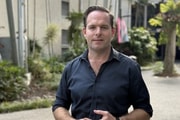David Koch explains why younger Aussies have ‘short end of the stick’ in housing market
By
Seia Ibanez
- Replies 138
David Koch, the former Sunrise host and current economic director for comparison website Compare the Market, has pointed out something older Australiansmay not want to hear.
He has explained that younger Australians bear the brunt of soaring interest rates and inflation while their older counterparts remain largely unaffected.
The Australian housing market has been a hot topic of discussion for years, with prices skyrocketing and making it increasingly difficult for younger generations to enter the property market.
This issue has been exacerbated by the recent rise in interest rates, which according to Koch, has hit young borrowers the hardest.
According to data from Compare the Market, homeowners who purchased property at the peak of the market in early 2022 are now finding themselves in a worse financial position each month compared to those who bought it three years earlier.
For instance, a Sydney homebuyer who purchased a property at the average price of $1.12 million in February 2022 and locked in a fixed rate of 2.2 per cent would now face minimum monthly repayments of $2,247 more than their current payment.
In contrast, homeowners who bought at the median price of about $780,000 in April 2019 on the same fixed rate have seen their repayments rise just $1,576 a month.
This means they are better off by $671 every month, or a total of $8,052 a year.
Furthermore, those who bought before the pandemic have benefited from a rise in equity as property prices have significantly increased over the past four years.
Koch has described this situation as a 'tough pill' for young Aussies who have not had time to save up.
'If you bought your home in early 2022 under the pretence that interest rates would stay low for longer, you've now been lumped with the short end of the stick,' Koch said.
'Meanwhile, a lot of mature Australians have missed this pain altogether after selling their properties at the peak and having reaped the benefits over more equity for years.’
'A lot of mature Australians have been shielded from the rate rises, and it's already widely believed that their spending drove inflation.'
A 2023 report from CommBank iQ found that spending among Australians aged over 35 appears to be fuelling Australia's inflation crisis as younger generations are forced to cut back on essentials.
Older generations were said to be going on holidays and dining out more often.
On the other hand, young Aussies were battling higher rents and mortgage repayments, reducing their spending to cope with the worst cost of living crisis in a generation.
Younger Aussies, particularly those aged 25 to 29, reportedly reduced their yearly spending.
Koch said, ‘It's time policy-makers should be asking: how could the pressure be more evenly spread?’
Many older homeowners have stressed that interest rates for home loans back then weren't as tough when looking at history.
In the late 1980s to early 1990s, home loan rates were a high 17 per cent, but today's variable rates are lower at six per cent.
They argued that the sacrifices young adults make now are incomparable to what they and past generations had to do.
However, Koch said new homebuyers are in a tougher spot than before.
For him, house prices had gone way up compared to what people earn, and this was happening faster than wages were growing.
'Back in the 80s, the average cost of an Aussie house was $70,000, now it's $700,000—ten times more expensive,' he said.
He explained that in the 1980s, the average salary was $19,000. In 2023, it was $94,000.
'So in the 80s, the price of a house was four times the average person's income,' he said.
'In 2023, it's eight times the average Aussie salary.'
He has also urged mortgage holders with higher repayments to call their banks and explore whether refinancing to a lower-rate loan is possible.
‘We urge people in mortgage pain to reduce the interest on their repayments as much as possible by shopping around for a better deal,' Koch said.
'When every dollar counts, 2024 should be the year of the new lender.'
The struggles of young Australians in the housing market are real and palpable.
Mira Almasri, a 35-year-old single mother, rents a one-bedroom apartment with her two children, aged nine and 14 in Mosman on Sydney's well-heeled north shore for $600 a week.
She has given up all hope of owning a Sydney home, stating, 'It's impossible to buy in Sydney.'
'Even if you earn loads of money, it's still hard. All my friends who have bought houses in the last two years say they are not happy at all because they are paying high-interest rates.'
Jacob Burrows, 22, an electrician from Perth, Western Australia, hopes to buy a property within the next 12 months despite interest rates being at their highest since 2012.
He has done a lot of research, including reading a book about a man who owned 30 properties by the age of 30.
However, he acknowledged that 'it's fairly hard at the moment because everything is so expensive’.
‘A couple of years ago, I wanted to try and understand the market to appreciate what's involved in buying a house,’ Burrows added.
‘I spent a year or so learning the housing market, and now I'm going to try to look for cheaper houses instead of buying one big one so that I can have a smaller deposit.'
Still, it’s not all rosy for older Australians.
On the other side of the spectrum, a report by Ageing in a Housing Crisis showed that having safe, secure, and affordable housing for older people has become increasingly difficult.
More older people also lived in marginal housing, as analysed by the Australian Bureau of Statistics census data and homelessness estimates.
The increase in housing costs, declining rates of home ownership, carrying mortgage debt into retirement, uncertainty in private rental arrangements, and the worsening shortage of social housing all indicate a widespread problem of housing insecurity.
This issue of insecure or unstable housing impacts people of all age groups. However, for older individuals, the challenges are exacerbated by factors such as limited income-earning potential, growing frailty, illness, caring responsibilities, an increasing need for at-home support, and age-related discrimination.

Members, what are your thoughts on this issue? Share them with us in the comments below.
He has explained that younger Australians bear the brunt of soaring interest rates and inflation while their older counterparts remain largely unaffected.
The Australian housing market has been a hot topic of discussion for years, with prices skyrocketing and making it increasingly difficult for younger generations to enter the property market.
This issue has been exacerbated by the recent rise in interest rates, which according to Koch, has hit young borrowers the hardest.
According to data from Compare the Market, homeowners who purchased property at the peak of the market in early 2022 are now finding themselves in a worse financial position each month compared to those who bought it three years earlier.
For instance, a Sydney homebuyer who purchased a property at the average price of $1.12 million in February 2022 and locked in a fixed rate of 2.2 per cent would now face minimum monthly repayments of $2,247 more than their current payment.
In contrast, homeowners who bought at the median price of about $780,000 in April 2019 on the same fixed rate have seen their repayments rise just $1,576 a month.
This means they are better off by $671 every month, or a total of $8,052 a year.
Furthermore, those who bought before the pandemic have benefited from a rise in equity as property prices have significantly increased over the past four years.
Koch has described this situation as a 'tough pill' for young Aussies who have not had time to save up.
'If you bought your home in early 2022 under the pretence that interest rates would stay low for longer, you've now been lumped with the short end of the stick,' Koch said.
'Meanwhile, a lot of mature Australians have missed this pain altogether after selling their properties at the peak and having reaped the benefits over more equity for years.’
'A lot of mature Australians have been shielded from the rate rises, and it's already widely believed that their spending drove inflation.'
A 2023 report from CommBank iQ found that spending among Australians aged over 35 appears to be fuelling Australia's inflation crisis as younger generations are forced to cut back on essentials.
Older generations were said to be going on holidays and dining out more often.
On the other hand, young Aussies were battling higher rents and mortgage repayments, reducing their spending to cope with the worst cost of living crisis in a generation.
Younger Aussies, particularly those aged 25 to 29, reportedly reduced their yearly spending.
Koch said, ‘It's time policy-makers should be asking: how could the pressure be more evenly spread?’
Many older homeowners have stressed that interest rates for home loans back then weren't as tough when looking at history.
In the late 1980s to early 1990s, home loan rates were a high 17 per cent, but today's variable rates are lower at six per cent.
They argued that the sacrifices young adults make now are incomparable to what they and past generations had to do.
However, Koch said new homebuyers are in a tougher spot than before.
For him, house prices had gone way up compared to what people earn, and this was happening faster than wages were growing.
'Back in the 80s, the average cost of an Aussie house was $70,000, now it's $700,000—ten times more expensive,' he said.
He explained that in the 1980s, the average salary was $19,000. In 2023, it was $94,000.
'So in the 80s, the price of a house was four times the average person's income,' he said.
'In 2023, it's eight times the average Aussie salary.'
He has also urged mortgage holders with higher repayments to call their banks and explore whether refinancing to a lower-rate loan is possible.
‘We urge people in mortgage pain to reduce the interest on their repayments as much as possible by shopping around for a better deal,' Koch said.
'When every dollar counts, 2024 should be the year of the new lender.'
The struggles of young Australians in the housing market are real and palpable.
Mira Almasri, a 35-year-old single mother, rents a one-bedroom apartment with her two children, aged nine and 14 in Mosman on Sydney's well-heeled north shore for $600 a week.
She has given up all hope of owning a Sydney home, stating, 'It's impossible to buy in Sydney.'
'Even if you earn loads of money, it's still hard. All my friends who have bought houses in the last two years say they are not happy at all because they are paying high-interest rates.'
Jacob Burrows, 22, an electrician from Perth, Western Australia, hopes to buy a property within the next 12 months despite interest rates being at their highest since 2012.
He has done a lot of research, including reading a book about a man who owned 30 properties by the age of 30.
However, he acknowledged that 'it's fairly hard at the moment because everything is so expensive’.
‘A couple of years ago, I wanted to try and understand the market to appreciate what's involved in buying a house,’ Burrows added.
‘I spent a year or so learning the housing market, and now I'm going to try to look for cheaper houses instead of buying one big one so that I can have a smaller deposit.'
Still, it’s not all rosy for older Australians.
On the other side of the spectrum, a report by Ageing in a Housing Crisis showed that having safe, secure, and affordable housing for older people has become increasingly difficult.
More older people also lived in marginal housing, as analysed by the Australian Bureau of Statistics census data and homelessness estimates.
The increase in housing costs, declining rates of home ownership, carrying mortgage debt into retirement, uncertainty in private rental arrangements, and the worsening shortage of social housing all indicate a widespread problem of housing insecurity.
This issue of insecure or unstable housing impacts people of all age groups. However, for older individuals, the challenges are exacerbated by factors such as limited income-earning potential, growing frailty, illness, caring responsibilities, an increasing need for at-home support, and age-related discrimination.
Key Takeaways
- David Koch delivered a stark message to older generations, pointing out how young Australians face struggles due to high interest rates and inflation.
- Research by Compare the Market indicates that recent homebuyers who purchased at market peak are financially worse off than those who bought homes several years prior.
- Older Australian homeowners have generally been cushioned from recent rate rises, having benefitted from increased property equity.
- Koch suggested that policymakers should consider ways to distribute economic pressures more equitably across generations.
Last edited by a moderator:









